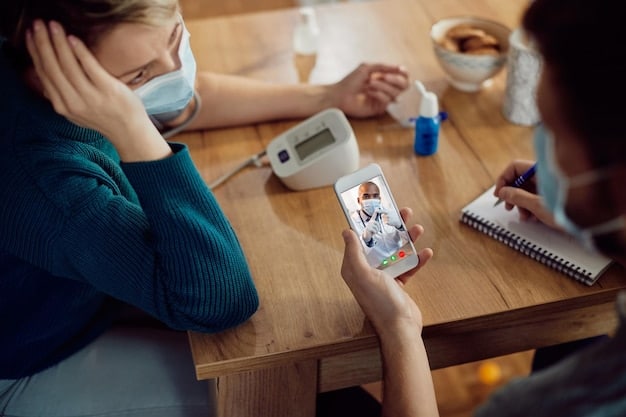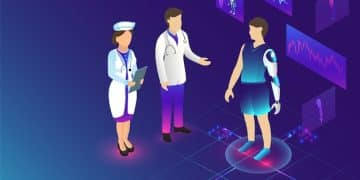AI-Driven Healthcare Chatbots: Revolutionizing Patient Engagement in US

AI-driven healthcare chatbots in the US enhance patient engagement and communication by providing instant, personalized support, streamlining administrative tasks, and improving access to medical information.
The integration of technology in healthcare is rapidly transforming how patients interact with medical services. Among these innovations, AI-driven healthcare chatbots: improving patient engagement and communication in US, stand out as a promising solution to enhance accessibility and streamline healthcare processes, helping in improving patient satisfaction.
Understanding AI Chatbots in Healthcare
AI chatbots are changing the landscape of healthcare by offering new ways for patients and providers to communicate. These virtual assistants use artificial intelligence to provide instant responses, personalized support, and efficient information delivery.
What are AI Healthcare Chatbots?
AI healthcare chatbots are computer programs designed to simulate conversations with users. They leverage technologies like natural language processing (NLP) and machine learning (ML) to understand and respond to patient inquiries.
- 24/7 Availability: Chatbots provide round-the-clock support, addressing patient queries at any time.
- Personalized Responses: They offer tailored information based on patient profiles and historical data.
- Efficient Triage: Chatbots can quickly assess patient symptoms and direct them to the appropriate care.
These chatbots are programmed to handle a wide array of tasks, from answering frequently asked questions to scheduling appointments and providing medication reminders. By automating these routine tasks, chatbots free up healthcare staff to focus on more complex patient needs.

Benefits of AI Chatbots for Patient Engagement
The adoption of AI chatbots in healthcare brings numerous advantages that directly impact patient engagement. These benefits range from improved access to medical information to enhanced communication channels, all contributing to a better patient experience.
One of the primary benefits is the ability to provide instant access to healthcare information. Unlike traditional methods that often involve long wait times, chatbots offer immediate responses to patient inquiries. This immediacy is particularly valuable for patients seeking quick answers to common questions about their health conditions, medications, or treatment plans.
Improving Communication
AI chatbots improve communication by offering various channels for patients to interact with healthcare providers. These virtual assistants are available through multiple platforms, including mobile apps, websites, and messaging services.
- Simplifying interactions: Patients can easily book appointments, request prescription refills, and access their medical records through chatbots.
- Answering common queries: Chatbots can answer many basic questions about healthcare services, reducing workload.
- Collecting patient feedback: Gathering insights on patient experience can help improve overall care quality.
Chatbots also play a crucial role in enhancing the patient experience by offering personalized support. Through machine learning algorithms, these virtual assistants are capable of analyzing patient data to provide tailored advice and recommendations.
Use Cases of AI-Driven Chatbots in US Healthcare
AI-driven chatbots are finding diverse applications across the US healthcare system, addressing specific needs and improving overall efficiency. From appointment scheduling to mental health support, these virtual assistants are enhancing various aspects of patient care.
Chatbots can automate the process of scheduling appointments. By integrating with electronic health record (EHR) systems, these chatbots can access real-time availability and allow patients to book appointments at their convenience.
Appointment Scheduling
The use of AI chatbots for appointment scheduling streamlines the process for both patients and healthcare providers. These virtual assistants can handle a high volume of scheduling requests, reducing wait times and administrative burdens.
Many healthcare organizations are leveraging chatbots to provide mental health support. These chatbots offer a safe and confidential space for individuals to discuss their feelings and concerns.
Mental Health Support
AI chatbots are extending their role into mental health support, providing timely and accessible assistance to individuals in need. These chatbots can offer a supportive environment, reducing the stigma and barriers associated with seeking mental healthcare.
- Confidential and anonymous support: Chatbots offer a secure way.
- Early intervention: Regular check-ins by chatbots can help prevent issues or relapse.
- Resource referral: Chatbots can point patients to resources and helplines.
The use of AI chatbots in chronic disease management enables healthcare providers to stay connected with patients. Monitoring adherence to medication schedules, answering questions, and escalating issues to care teams is crucial in many clinical instances for better care outcomes.

Challenges and Considerations for Implementation
While AI chatbots offer significant benefits, their implementation in healthcare also presents challenges and considerations that need to be addressed carefully. Data security, privacy concerns, and regulatory compliance are critical aspects to consider to ensure responsible and ethical use of this technology.
Protecting patient data is a paramount concern when implementing AI chatbots in healthcare. These virtual assistants handle sensitive information, including medical history and personal details, making data security a top priority.
Data Security and Privacy
Ensuring robust data security and maintaining patient privacy are essential when deploying AI chatbots in healthcare. Healthcare organizations must implement strict protocols to protect sensitive information from unauthorized access and cyber threats.
The reliability and accuracy of AI chatbots are also crucial factors in healthcare. Patients rely on the information provided by these virtual assistants to make informed decisions about their health. Therefore, it is essential to ensure that chatbots deliver accurate and evidence-based information.
Future Trends in AI Chatbots for Healthcare
The future of AI chatbots in healthcare is promising, with ongoing advancements and emerging trends set to further transform patient engagement and communication. Integration with wearable devices, personalized medicine, and enhanced NLP capabilities are among the key areas of development.
Wearable devices, such as smartwatches and fitness trackers, generate vast amounts of health data. Integrating AI chatbots with these devices can provide patients with personalized insights and recommendations based on their activity levels, sleep patterns, and vital signs.
Integration with Wearable Devices
The pairing of AI chatbots with wearable devices offers a new level of personalized healthcare. This integration allows for real-time monitoring and customized interventions, improving patient care and outcomes.
- Real-time health insights: Chatbots can analyze data from wearables to identify trends.
- Personalized recommendations: Based on insights, assist to stay on track.
- Remote monitoring: Chatbots enable healthcare, keeping patients connected with physicians.
The use of chatbots to create personalized medicine is rapidly evolving. Chatbots are adept at collecting in-depth personal health data from patients. This data, coupled with AI-based analytics, can provide precise treatment protocols.
Conclusion
AI-driven healthcare chatbots are revolutionizing patient engagement and communication in US healthcare. Improving accessibility, convenience, and personalization, these virtual assistants enhance the patient experience and streamline healthcare processes. While challenges related to data security, privacy, and accuracy must be addressed, the future of AI chatbots in healthcare looks promising, with ongoing advancements paving the way for even greater improvements in patient care and outcomes.
| Key Point | Brief Description |
|---|---|
| 🤖Accessibility | 24/7 availability, instant answers, reduce wait times, and provide quick access. |
| 🤝 Communication | Enhances channels via apps/web, facilitating appointments. |
| 🛡️Data Security | Critical protocols to keep patient data safe from unauthorized access and cyber threats. |
| ⚕️Mental Health | Providing confidential and timely assistance to individuals in need. |
Frequently Asked Questions
▼
AI chatbots provide round-the-clock support, enabling patients to access healthcare information and services at any time, regardless of location. This increases accessibility for individuals in remote areas or those with limited mobility.
▼
AI chatbots streamline the appointment scheduling process, reducing wait times and administrative burdens. Patients can easily book appointments, reschedule, or cancel existing appointments through a user-friendly interface.
▼
AI chatbots must comply with data and privacy regulations, just as other digital healthcare services. Healthcare organizations implement strict protocols to protect sensitive information from unauthorized access and cyber threats.
▼
Yes, AI chatbots can analyze patient data such as medical history and lifestyle habits to offer personalized recommendations. These recommendations can include diet plans, exercise routines, and medication reminders, which enhance patient outcomes.
▼
The future of AI chatbots in mental health is promising, with advancements focused on early intervention and personalized support. These chatbots can offer a supportive environment, monitor mood changes, and connect individuals with mental health professionals.
Conclusion
In summary, AI-driven healthcare chatbots: improving patient engagement and communication in US healthcare represents a paradigm shift in how medical services are delivered and accessed. By offering 24/7 assistance, personalized interactions, and efficient task automation, these virtual assistants stand to significantly enhance the patient experience and promote better health outcomes across the nation.





